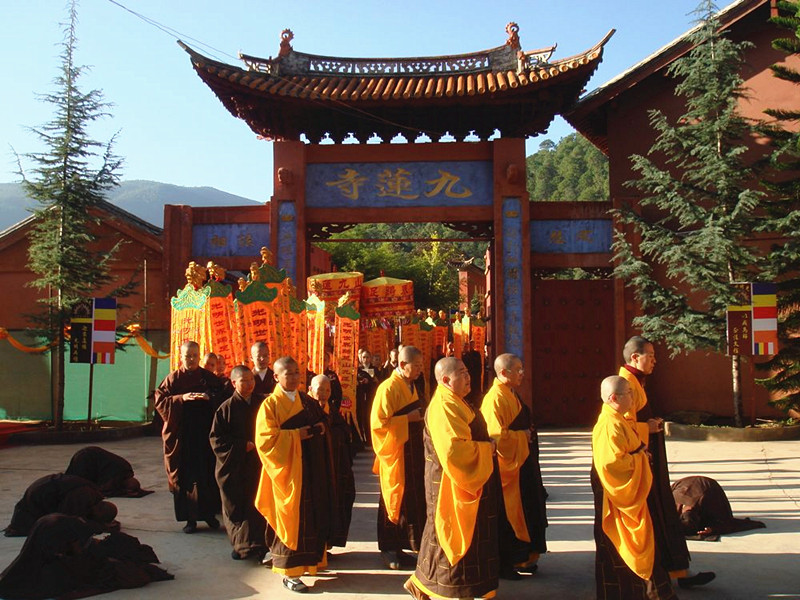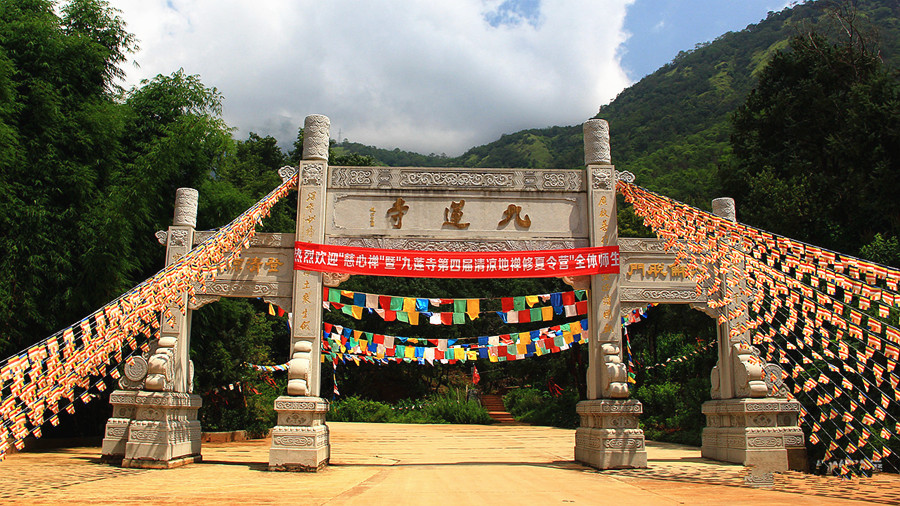Jiulian Temple of Jizu Mountain in Binchuan County, Dali
Jiulian Temple (九莲寺), located in Jizu Mountain (鸡足山) in Binchuan County (宾川县), Dali (大理), Yunnan Province (云南省), China, was founded by Master Wuwei (无为法师) in the 38th year of the Wanli era (万历) during the Ming Dynasty (明朝) (1610). It was rebuilt in 1997 under the supervision of Master Changying (常应法师), with the current abbot being Master Guoqing (果清法师). The temple belongs to the Linji sect (临济宗) of Buddhism. Known for its vegetarian cuisine, it attracts visitors who appreciate its exquisite flavors and presentation.
Temple Introduction

Jiulian Temple (九莲寺) is situated on the western side of Ling Mountain (灵山), with a charming layout that features fragrant flowers and lush greenery, creating an elegant environment. The temple is surrounded by a century-old chestnut orchard, enhancing its picturesque landscape.
Cultural Significance
Yunnan’s (云南) Buddhist culture is deeply rooted, with Dali (大理) historically referred to as the “Pure Land of Wonderful Fragrance” (妙香佛国). Jizu Mountain (鸡足山) is known as the site where Kasyapa (迦叶), the Buddha’s (佛陀) foremost disciple, awaits the future arrival of Maitreya Buddha (弥勒佛).
Historical Development
Jiulian Temple (九莲寺) began construction in the 38th year of the Wanli era (万历) (1610). Over the years, it has undergone various renovations, including significant repairs in 1952, 1963, and a major restoration in 1985 after being damaged during the Cultural Revolution (文化大革命).
Restoration Efforts
In 1997, under Master Changying (常应法师), the temple was restored to include major structures like the Heavenly King Hall (天王殿), Mahaviro Hall (大雄宝殿), Three Saints Hall (三圣殿), and a Scripture Library (藏经楼), among others. The architectural area spans approximately 12,600 square meters.
Unique Features
The temple boasts a rare flower known as “Ziwulian” (子午莲), which blooms only at noon, and an ancient cypress tree (柏树) that symbolizes resilience and renewal, flourishing after years of dormancy following the Cultural Revolution (文化大革命).
Academic Contributions

In 2000, the temple established a Bodhisattva (菩萨) precepts transmission for 868 lay Buddhists (居士). Subsequently, it opened a section of Yunnan Buddhist Academy (云南佛学院) for nuns in 2003, offering various courses in Buddhist studies (佛学), ethics (伦理), and languages (语言).
Daily Life and Practices
The temple is known for its disciplined daily routines, including chanting (诵经), meditation (打坐), and vegetarian meals (素食), contributing to a serene and respectful atmosphere that attracts both laypeople and pilgrims.
Getting There
To reach Jiulian Temple (九莲寺) in Jizu Mountain (鸡足山), visitors can take a bus from Dali (大理) to Binchuan County (宾川县). Local transportation, such as taxis or ride-hailing services, is also available for a more direct route to the temple.
Attractions Nearby
- Jizu Mountain (鸡足山): Known for its stunning landscapes and cultural significance in Buddhism.
- Dali Ancient Town (大理古城): A historic town with rich cultural heritage and beautiful scenery.
Jiulian Temple (九莲寺) is not just a place of worship but also a hub of cultural education and tranquility, making it a must-visit destination in Yunnan Province (云南省).

 7 Days GolfingTour
7 Days GolfingTour
 8 Days Group Tour
8 Days Group Tour
 8 Days Yunnan Tour
8 Days Yunnan Tour
 7 Days Shangri La Hiking
7 Days Shangri La Hiking
 11 Days Yunnan Tour
11 Days Yunnan Tour
 6 Days Yuanyang Terraces
6 Days Yuanyang Terraces
 11 Days Yunnan Tour
11 Days Yunnan Tour
 8 Days South Yunnan
8 Days South Yunnan
 7 Days Tea Tour
7 Days Tea Tour
 8 Days Muslim Tour
8 Days Muslim Tour
 12 Days Self-Driving
12 Days Self-Driving
 4 Days Haba Climbing
4 Days Haba Climbing
 Tiger Leaping Gorge
Tiger Leaping Gorge
 Stone Forest
Stone Forest
 Yunnan-Tibet
Yunnan-Tibet
 Hani Rice Terraces
Hani Rice Terraces
 Kunming
Kunming
 Lijiang
Lijiang
 Shangri-la
Shangri-la
 Dali
Dali
 XishuangBanna
XishuangBanna
 Honghe
Honghe
 Kunming
Kunming
 Lijiang
Lijiang
 Shangri-la
Shangri-la
 Yuanyang Rice Terraces
Yuanyang Rice Terraces
 Nujiang
Nujiang
 XishuangBanna
XishuangBanna
 Spring City Golf
Spring City Golf
 Snow Mountain Golf
Snow Mountain Golf
 Stone Mountain Golf
Stone Mountain Golf















